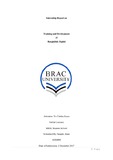| dc.contributor.advisor | Enam, Fabiha | |
| dc.contributor.author | Alam, Sanjida | |
| dc.date.accessioned | 2018-01-03T10:00:38Z | |
| dc.date.available | 2018-01-03T10:00:38Z | |
| dc.date.copyright | B. Business Administration | |
| dc.date.issued | 2017-12-02 | |
| dc.identifier.other | ID 14204005 | |
| dc.identifier.uri | http://hdl.handle.net/10361/8901 | |
| dc.description | This internship report is submitted in a partial fulfillment of the requirements for the degree of Bachelor of Business Administration, 2017. | en_US |
| dc.description | Cataloged from PDF version of internship report. | |
| dc.description | Includes bibliographical references (page 23). | |
| dc.description.abstract | Banglalink Digital Communications Limited is one of the leading companies in the telecom industry of Bangladesh and holds the second position in terms of market share. The company has a total workforce of around 2300 employees out of which 1195 are temporary workers with a male female ratio of 75% and 25% respectively. Banglalink as an employer highly emphasizes an employee-oriented workplace culture and values the well-being of its employees. Besides, the company focuses on being complaint with all the laws and policies as per Government and state regulations. As per the Bangladesh Labor Law 2006, no temporary employee can work for a permanent nature job on a continuous basis. So to comply with the conditions of this legal enactment the company took decisions to convert its temporary workforce as permanent employees of the organization. Although the companyhas been focusing on this issue for quite a long time, it could not begin the process until 2013 due to budget constraint. From November, 2013 the company started the process of converting all its temporary staff in various departments to permanent under a project called the Batch Conversion Project. The Project was put into action from November 2, 2013 and since then 5 Batches; each batch consisting of about more 100 employees have been converted to permanent employees. Over a total 500 employees have been converted to permanent. The project is carried out under the direct supervision of the HR and Administration Director and co-ordinated under the HR Operations Unit. The project is aimed not only to maintain legal and compliance issues but also to create a sense of belongingness and motivation among employees through recognising their contribution towards the company by securing their employment and offering various facilities. This project has been welcomed by the employees across departments but there are some underlying issues in theprocess.
The main purpose of the report is to assess the overall Batch Conversion Process considering the efficiency of the process and its impact on the employees covering various issues employment. Firstly, the assessment of the entire conversion process shows that although the employees are being confirmed as permanent, they are not being upgraded in their position. The level L18 being assigned to them is same for all employees across department irrespective of their tenure of employment with the company. This has aroused significant amount of satisfaction among the employees, especially the senior temporary staff, many of whom have been serving the company for more than 4 years. Secondly, the newly permanent staffs are not receiving a considerable raise in their salary. Those who have served for less
IV | P a g e
than 4 years as temporary employees are receiving a raise of 7.5% whereas others with great period of service is getting a raise of 10% of their basic salary. The average salary of the temporaries being around Tk 12,500, the increment is not much according to the employees, most of whom are the bread earners of their families. Thirdly, many employees do not have detailed idea of the Batch Conversion Project form beforehand and come for completing formalities to the Head Office with the mere knowledge that they are being converted as permanent. This arises a lot of confusion among the temporaries. Moreover, the process itself involves lot of paper work and manual input of data that makes the entire procedure quite lengthy and time-consuming on both the part of the employees and management. To solve some the gaps or shortcomings in the project the company has many options that they can undertake. Firstly, the designation and salary issue can be solved by giving the employees an opportunity to sit in an exam and qualify themselves for the next upgraded position with a better salary. Secondly, a meeting session can be held with line managers and HR representative where a briefing about the conversion program will be provided to employees so that they can have an idea of the project. And finally the process can be made more efficient by automating the steps involved which will save both time and paper work of the company. | en_US |
| dc.description.statementofresponsibility | Sanjida Alam | |
| dc.format.extent | 25 pages | |
| dc.language.iso | en | en_US |
| dc.publisher | BRAC University | en_US |
| dc.rights | BRAC University Internship reports are protected by copyright. They may be viewed from this source for any purpose, but reproduction or distribution in any format is prohibited without written permission. | |
| dc.subject | Banglalink Digital Communications Limited | en_US |
| dc.subject | Telecommunication company | en_US |
| dc.title | Training and development of Banglalink Digital | en_US |
| dc.type | Internship report | en_US |
| dc.contributor.department | BRAC Business School, BRAC University | |

